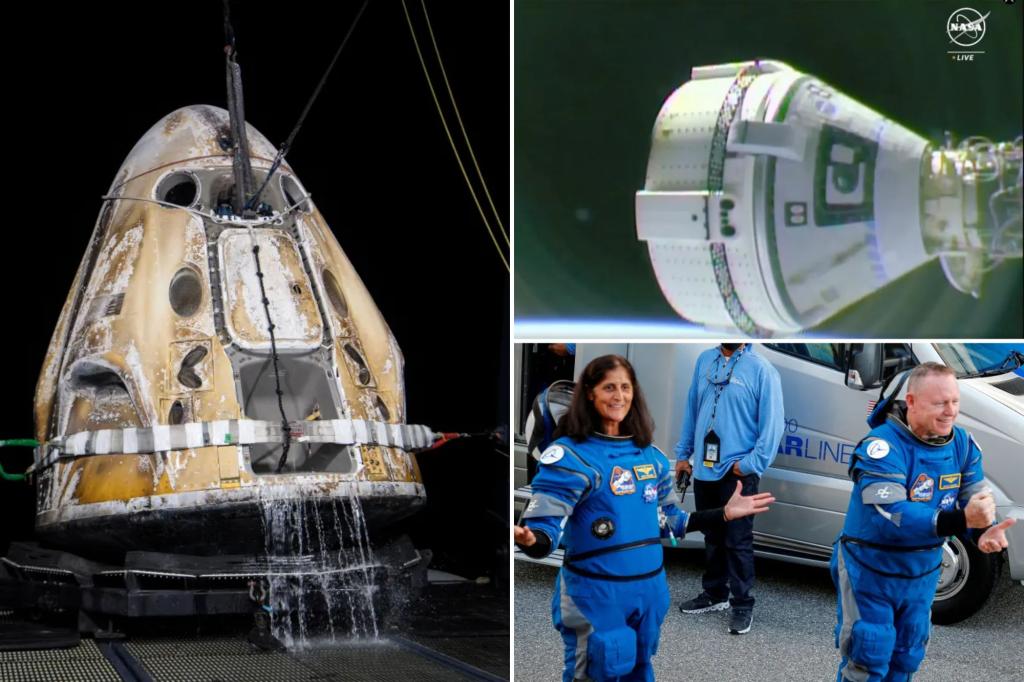SpaceX may be forced to come to the rescue of two astronauts stranded at the International Space Station after their Boeing Starliner suffered troubling helium leaks.
Astronauts Butch Wilmore and Suni Williams soared into space on the Starliner on June 5 and were only supposed to remain at the ISS for nine days — but issues with their ship have left their return date still up in the air, and NASA is now furiously trying to help solve the problem.
Boeing-rival SpaceX could potentially end up being tapped to ultimately bring them home aboard its Crew Dragon spaceship.
The outcome would serve as a severe blow to troubled aerospace giant Boeing, which has spent about $1.5 billion in cost overruns — beyond its initial $4.5 billion contract with NASA — in hopes of making Starliner a second option to reach the ISS.
While NASA and Boeing officials have reiterated that the current problems aboard the Starliner don’t indicate the need for SpaceX to lend a hand, the Crew Dragon is up to the task.
The SpaceX ship, which recently ferried four astronauts to the ISS in March, is capable of carrying two to four passengers at a time, but it can fit additional occupants in an emergency.
SpaceX had served as the sole commercial company approved to transport astronauts and cargo to the space station since 2020.
SpaceX did not immediately respond to The Post’s request for comment Tuesday.
Michael Lembeck, an aerospace engineering associate professor at the University of Illinois Urbana-Champaign who served as a consultant for Boeing’s spaceflight division from 2009 to 2014, told The Post that the Starliner is still likely to be Wilmore and Williams’ ride back to Earth.
“Right now, I’d say the need for SpaceX to step up is very low,” Lembeck said. “We would have to see a big problem come up in the next couple of days to warrant that reaction.”
Lembeck and Katsuo Kurabayashi, a professor of aerospace engineering at New York University, told The Post that NASA most likely delayed the return trip home so that they could spend more time studying the craft while it’s still attached to the ISS to learn more about what went wrong and how to avoid it for its next mission.
While the capsule carrying the astronauts will make it back to Earth, the service module — which stores the engines, fuel and the helium tanks — will not, Lembeck explained.
“With ample helium gas remaining, it’s prudent for the teams to take sufficient time to ensure that Starliner is fully prepared and certified for the return journey,” Kurabayashi added.
The NYU prof noted that the situation remains fluid and that the next updates that come from NASA will be an indicator on how the issue has developed.
“If they start talking about a rescue mission by chance, it would indicate that there are some serious, potentially life-threatening hardware defects found with Sarliner,” Kurabayashi said.
The last time a NASA astronaut needed help returning to Earth was in 2022, when Russia’s Soyuz capsule sprang a leak with American Frank Rubio on board.
While NASA had considered tapping SpaceX for help, Rubio eventually returned aboard an empty Soyuz capsule that Russia launched.
The incident extended Rubio’s six-month mission to one that lasted more than a year, or 371 days, a recording-breaking length for an American in space.
#SpaceX #rescue #Boeing #Starliners #stranded #astronauts,
#SpaceX #rescue #Boeing #Starliners #stranded #astronauts
